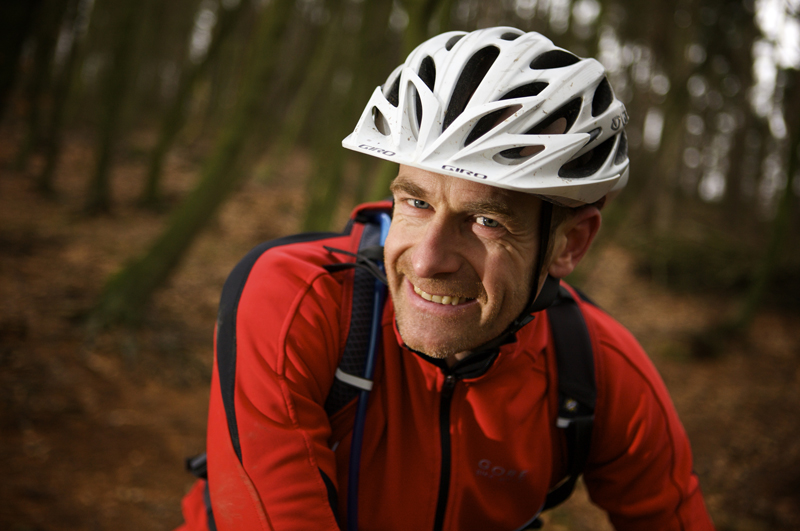Merida has conquered the world with its cross-country race team, but now the company has relaxed a bit to launch a new range of trail hardtails.
The 850-D isn’t perfect, but for a first attempt it’s got all the core values sorted. What’s more, cashing in on its full potential is only a couple of cheap upgrades away.
Ride: inspirational agility
What strikes you first about the TFS Trail is its compact dimensions – the sharply sloped top tube and short wheelbase create a bike that feels more like a 15in-16in ride than a 17in one.
There’s plenty of seat post to handle riders up to six feet tall, but if you’re after a more relaxed cross-country bike than a real chuckabout you might be happier sizing up to the 19in.
Down the local singletrack, though, the bike proved ideal for really letting rip through the tight stuff. Thanks to a 490mm ride height fork rather than a 470mm item, the real handling angles are slightly slacker than the published angles, which puts the TFS right into the current technical trail sweet spot.
You can still turn without tripping up when you jam the fork right through its travel under braking or off drops, and it’ll keep fairly centred if you relax and let it run through rooty/rocky hell. A relatively slack seat angle means a more centred slide than the tail-happy Saracen when things go sideways.
The short wheelbase means it’s still no steady Eddie, though, and it requires concentration and constant vigilance on faster sections.
The payback is that it’ll turn on a dime with inspirational agility. Frame response is excellent, too – tight enough to kick hard and clean crux climbing moves when you need it, but not so brutal that you’re left bruised after an hour of hammering.
Add in its impressively low cross-country race-level weight and this would be a great bike for longer singletrack adventures, or for people who ride marathons for the descents and technical sections and don’t want to die on the long fire road climbs.
The only thing literally cramping the Merida’s style is the cross-country cockpit. That 100mm stem and 25in bars impose a more staid feel on proceedings than we’d like.
In fact, sticking on a shorter stem and a wider bar immediately liberated the ready-to-riot character of the Merida. Whoever was riding it found themselves hanging off all over the place, popping it from rock to root to big sideways slides and generally having a total blast.
Frame: high quality skeleton keeps weight down
The TFS Trail is an all-new frame, but there are plenty of Merida manufacturing features in there.
The ‘Egg shape’ ring-reinforced head tube helps stiffen the front end from trail forces before they get to the flared and fluted top and down tubes. The two main tubes swage together for extra strength at the head end, and the radically sloped top tube gets a very neat curved reinforcing tube.
There’s more dramatic tubing out back as the chainstays switch from tall, narrow ovals alongside the tyre to an almost flat triangular section in the centre.
Simple dropouts make the connection to rectangular seat stays, and there are rack mounts top and bottom in case you need to load up and lug at some point.
Typically for Merida, finishing is excellent throughout and the high-quality frame is a key part of the 850’s very impressive overall weight.
Our only concern is that the tiny (replaceable) dropout retaining bolts had already stripped their threads before the bike was delivered to us. It’s the same design that Merida has used for three years, though, and to be fair we’ve never had any trouble with it before.
Equipment: no need for major upgrades
While a shorter stem and broader handlebar would be on our list for close combat singletrack work, and lock-on grips are an essential for wet work, there’s nothing else here you’d need to rush to change.
RockShox Recon forks acquitted themselves perfectly well until serious step-infested terrain caused rebound indigestion, but you’re unlikely to get better for the price.
The Shimano stop/go kit was as predictably smooth and controlled as ever, and Merida also fits 170mm cranks on the smallest model, which is a nice touch.
Alex rims are the reliable reality behind a lot of big-name wheels, and the LX hubs will run forever.
We were more impressed than we expected by the fat Merida tyres. The shallow tread means they’re predictably slippery, but they’re very fast-rolling, and their reasonably sticky tread compound ensures they’re not treacherous on wet winter roots and rocks.
The X Mission gear all works fine, and together with the skinny saddle helps keep weight low for the money, broadening the Merida’s range far beyond a blast down the woods.
Summary: genuine versatility with upgrade potential
The cross-country-style cockpit cramps its radical riding potential compared with others in its class, but this light, lively and well specced bike is great fun straight from the box. The sorted, top-quality frame gives genuine marathon-to-mentalism versatility, as well as value that’s well worth upgrading.


